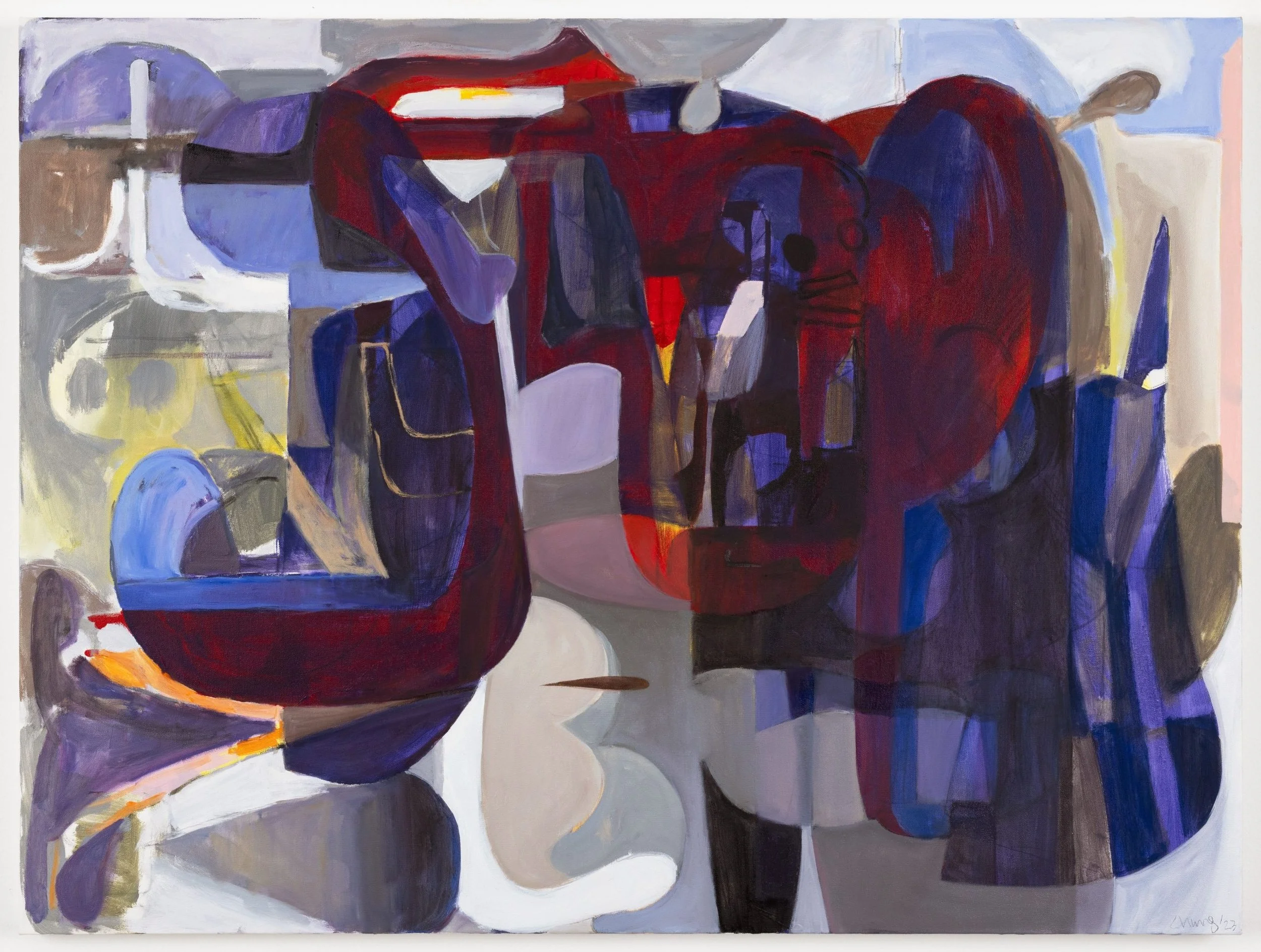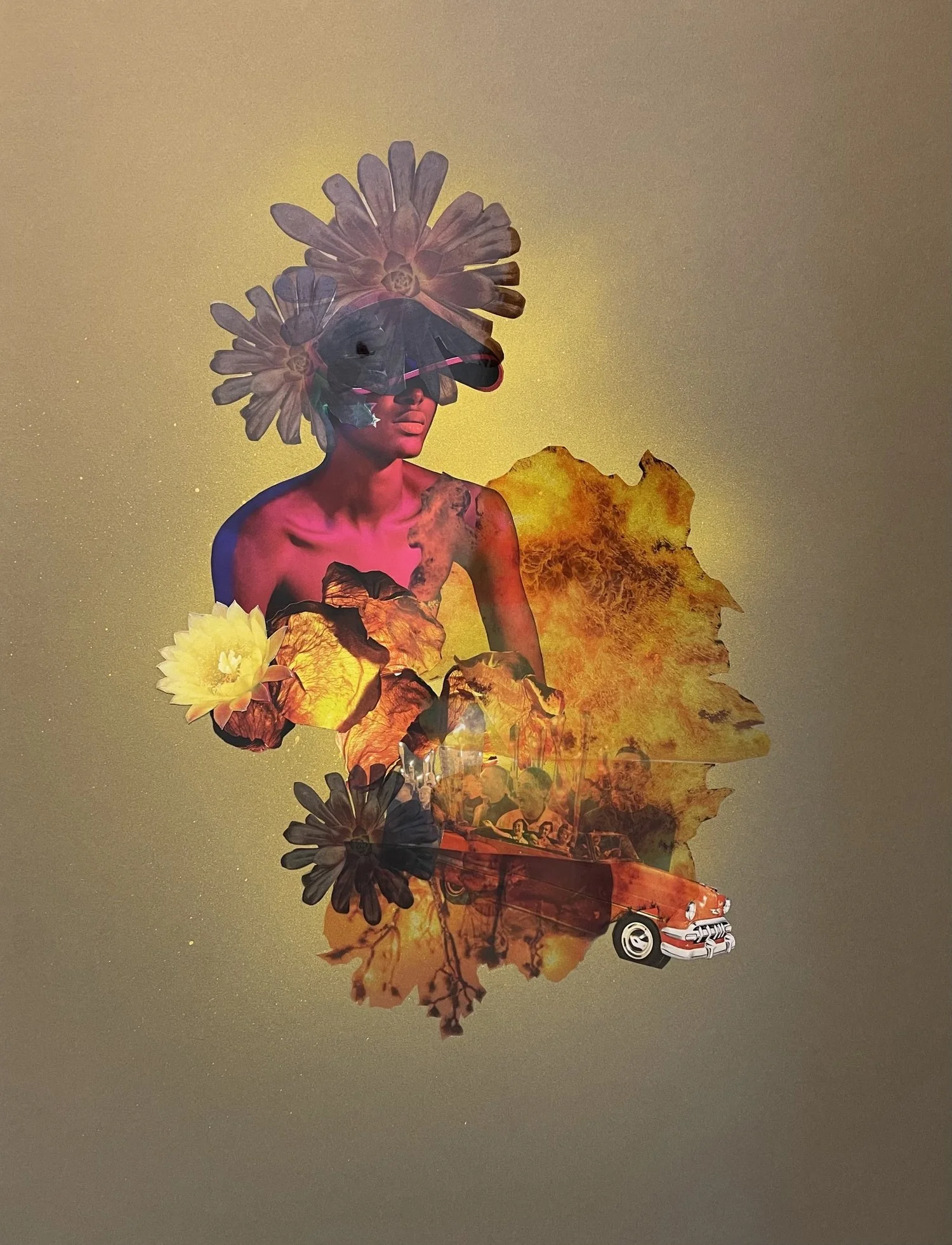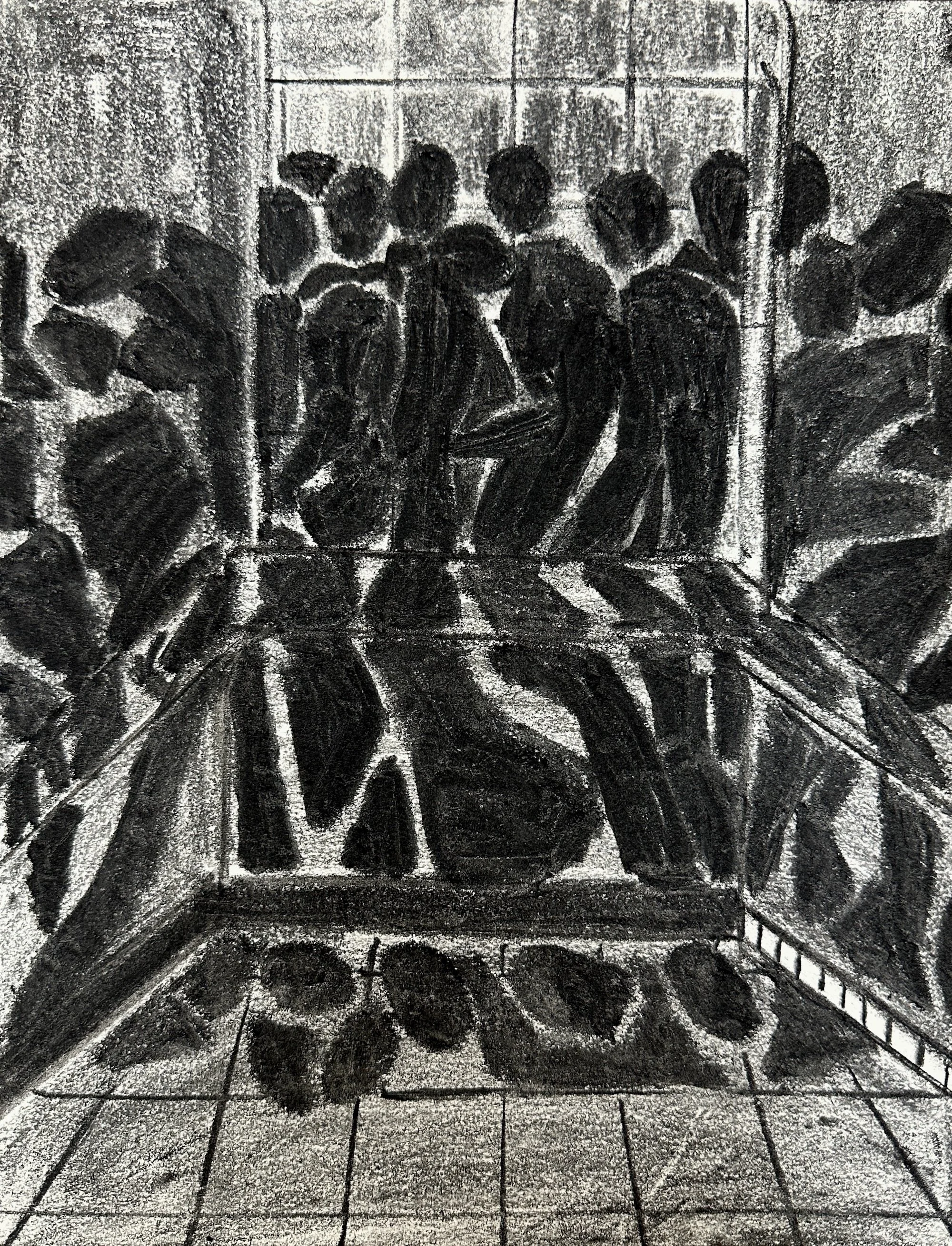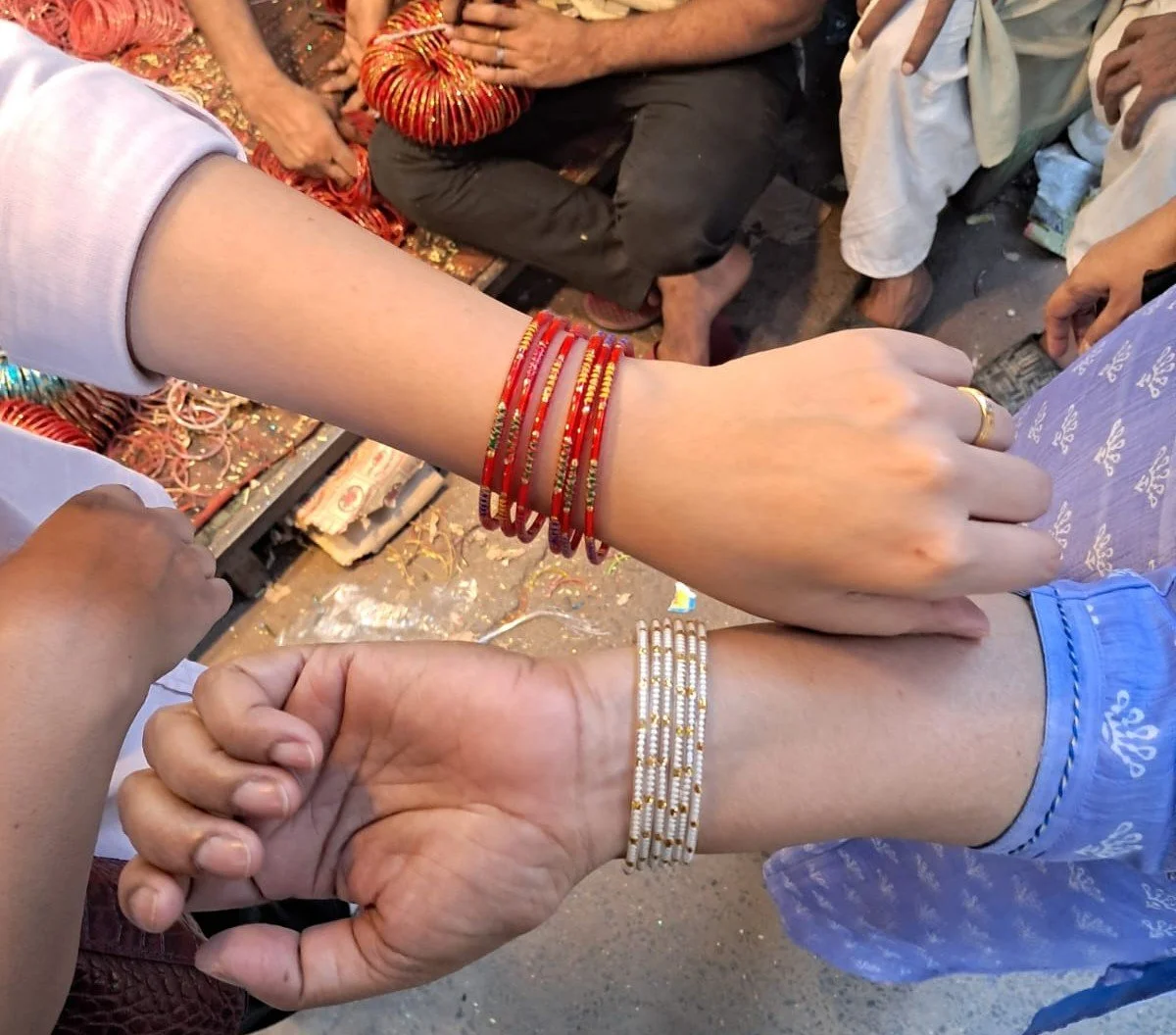Dear Pluto
By Susan L. Lin
Tsherin Sherpa - Melt (2017), Acrylic, ink, platinum leaf on canvas
Image description: An illustration of a multi-coloured and blue-skinned Tibetan god in a distorted swirl, with melting drips along the edges. This swirly figure is painted against a gold, platinum-leaf backdrop.
DEAR PLUTO,
I’m writing to share my plans to visit you in the distant future. You’ll be the ball of ice and rock in the Kuiper Belt. I’ll be the figure wearing the spacesuit, stepping off the spacecraft, making my way through the spacegalaxy. If my calculations are correct, I’ll reach you in a decade. I hope you’ll be waiting at the end of my journey. We can throw a party when I finally land, print B.Y.O.R. on the invites.
B.Y.O.R. = Bring Your Own Rings
Yes, I know you don’t usually accessorize. I don’t either. But my arrival will be a special occasion, as good an excuse as any to raid our jewelry boxes. Maybe Saturn will watch the festivities from afar with envy. Uranus, Jupiter, and Neptune, too. That clique right there loves to flaunt their rings at every hour of every day for all the solar system to see.
I’ve started and restarted this letter a dozen times, unsure where to begin. I’m afraid there’s no way of writing it that doesn’t paint me a stalker in desperate need of a restraining order. Maybe that’s exactly what I am. It’s true that you don’t know me. It’s true that we’ve never met. I’ve never even laid eyes on you in person-planet. (I don’t own a telescope, and even if I did, spying on you without your knowledge seems even more deplorable.)
But I was a toddler when I first saw your picture on glossy posters of the Milky Way that used to hang in my bedroom. The complimentary ones folded between pages of National Geographic magazines, to which my father was an avid subscriber. You were that dot on the outermost reaches of the solar system, rejected from a prime location in the inner circle. Even at a young age, I could imagine how isolating that must’ve felt.
I was seven when I began learning more about the history of you. Every time my teacher wheeled the LaserDisc player into the storage closet, I knew we’d be treated to more animations of celestial bodies that were, like all of us, orbiting the sun. Being packed into that tiny space like tinned fish didn’t bother me because there you were, again, on that grainy screen: taking the scenic route through the darkness, patiently carving your own path around everyone else.
That same year, I memorized the universal mnemonic device for recounting the order of the planets.
My Very Educated Mother Just Served Us Nine Pizzas = Mercury, Venus, Earth, Mars, Jupiter, Saturn, Uranus, Neptune, Pluto
The local pizza buffet advertised a special for Wednesdays, emblazoned on their windows: all-you-can-eat pizza, pasta, and salad for the low price of $1.99, with kids under ten devouring everything in sight for only 99 cents. Whenever we dined there, I thought of you.
I was eight when my homeroom teacher measured and weighed us to begin the year. At four-feet-zero and forty-eight pounds, even after putting away all that bread and cheese, I remained the smallest in my class. Another dubious distinction we held in common. I wonder if, like me, you grew up binge-eating space junk because you hoped you could one day balloon out like Jupiter? I bet you understood the embarrassment of being the only planet in the galaxy unable to donate a piece of yourself to help others in need.
I was ten when I started writing letters. My elementary school believed in Routines. My elementary school believed in The Arts. My elementary school believed, above all else, in Acronyms. And so, our principal decreed that the first school hour of every Monday would be W.I.S.H. time.
W.I.S.H. = Writing Is Special Here!
Maybe I should’ve tried to contact you as early as then. I’m sorry now that I didn’t. We could’ve been pen pals trading anecdotes back and forth for decades. I could’ve read your life story in your own words instead of believing the passages in a science textbook written by yet another human who’d never met you. The truth is, by that time I had forgotten about you. The truth is, something deeply traumatic happened to me the year before, when I was nine. I no longer trusted anybody, even if said body happened to be a hunk of space rock 2.66 billion miles away.
I thought, foolishly, that if I didn’t think about it, it couldn’t hurt me anymore.
I was eleven when I saw my former B.F.F. again. We crossed paths at the local pizza buffet, of all places. I was with my family. (She no longer had one.) She was with her new friends. (I no longer had any.) “Hi!” she exclaimed, stopping in her tracks on the way to an empty table, as if she had never chosen, repeatedly, to inflict physical harm. “Hi!” I exclaimed, a half-eaten slice between my lips, as if I had never lived in a constant state of terror every second she was near. In that moment, I wasn’t thinking about what she’d done to me. I wasn’t even thinking about you. I wasn’t thinking about much of anything but the unfinished crunchy taco pizza on my plate.
B.F.F. = Best Friend Fornever
Crunchy Taco Pizza = crisp paper-thin crust + hot sauce + ground beef + shredded lettuce + shredded cheese
I wished I could shred all my memories from that lost year until they were unrecognizable, illegible, impossible to put back together. But that would mean losing the bright spots that shimmered like stars on the fringe of a black hole: organizing a renegade Pizza Party the month before the 1996 Presidential Election; building a miniature house with working electricity out of paperclips, brass brad fasteners, and battery packs; standing on stage in front of the whole school during R.I.F. week and reading aloud from my winning essay about the importance of literacy.
R.I.F. = Reading Is Fun…damental!
I was nineteen when I found out you weren’t a planet anymore. Reading news of the controversial decision, on the front page of the Houston Chronicle a mere month after my summer Astronomy 101 course concluded, was no fun at all. A childhood refrain returned to me, unbidden, as I sat at the kitchen table you were now being denied a seat at:
My Very Educated Mother Served Us Nine—
My Very Educated Mother Served Us Nine—
Suddenly, we weren’t allowed to finish the thought.
Indeed, the local pizza buffet was still thriving twelve years later. In fact, they’d recently moved to a larger plot of land that faced the state highway. An adult plate now cost upwards of $7. They didn’t even offer habitual discounts anymore. We still ate there anyway, sometimes. But I no longer thought of you when we did.
I was almost twenty-five the first time I discovered someone who hadn’t heard the news of your demotion, and for a brief moment, the idea of it warmed my heart. For a brief moment, I wanted to live in her oblivious world. Then she spent the rest of our lunch casting aspersions on a mutual family member and banishing a fellow human being’s dreams into the ether. We went our separate ways without a word about my imminent birthday.
Another eight years would pass before I fully rediscovered my love for the cosmos, trust issues be damned.
And so I’m writing today to share my plans to visit you in the distant future. If you say no, I will respect your decision. I will not don my spacesuit, and I will not enter my spacecraft, and I will not begin making my way through our spacegalaxy.
I hope you say yes. In ten years time, I hope I’ll be there—with rings on.
Tsherin Sherpa - Multiple Protector (2013), Acrylic, ink, platinum leaf on canvas
Image description: An illustration of three multi-coloured Tibetan gods with blue, red and bright yellow skin, in a distorted swirl. These swirly figures are painted against a gold, platinum-leaf backdrop.
Susan L. Lin is a Taiwanese American storyteller who hails from southeast Texas and holds an MFA in Writing from California College of the Arts. Her novella GOODBYE TO THE OCEAN was the winner of the 2022 Etchings Press novella prize. More of her work can be found online at https://susanllin.wordpress.com/.
*
Born in Kathmandu, Nepal in 1968, Tsherin Sherpa currently works and resides between California, USA and Nepal. From the age of 12, he studied traditional Tibetan thangka painting with his father Master Urgen Dorje.
In 1998, Sherpa immigrated to California, where he taught traditional thangka painting at various Buddhist Centers until he began to explore his own style- reimagining tantric motifs, symbols, colors and gestures placed in resolutely contemporary compositions. Sherpa also borrows imagery from classical Tibetan Buddhist iconography to abstract, fragment and reconstruct the traditional image to investigate and explore his personal diasporic experiences and the dichotomy found where sacred and secular culture collide. By employing mass culture’s ubiquitous noise, Tsherin imports these representations into a heightened dialogue where Buddhist icons and global affairs can renegotiate into a mirror-like transmutation.
If you’ve enjoyed reading this article, please consider making a donation. Your donation goes towards paying our contributors and a modest stipend to our editors. Singapore Unbound is powered by volunteers, and we depend on individual supporters. To maintain our independence, we do not seek or accept direct funding from any government.











‘Style, tone, and form aren’t just decoration—they’re the architecture of meaning... A plastic chalice cannot hold sacred wine.’ – an essay on meaning-making by Chadawan Yuddhara.